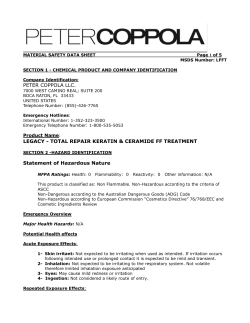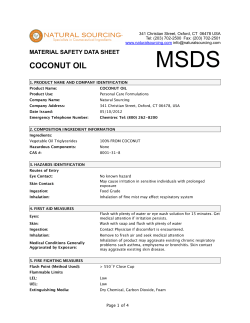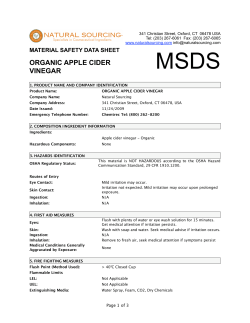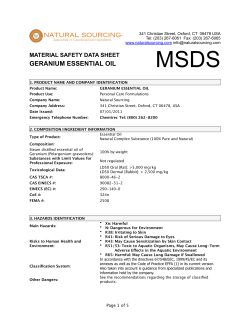
Safety Data Sheet according to (EC) No 1907/2006
Safety Data Sheet according to (EC) No 1907/2006 Page 1 of 8 sds no. : 188381 V001.3 Tangit FP 550 Fire Protection Part A Revision: 30.11.2011 printing date: 21.10.2014 SECTION 1: Identification of the substance/mixture and of the company/undertaking Product identifier: Tangit FP 550 Fire Protection Part A Relevant identified uses of the substance or mixture and uses advised against: Intended use: Foam, 2-component without propellant gas Details of the supplier of the safety data sheet: Henkel AG & Co. KGaA Henkelstr. 67 40191 Düsseldorf Germany Phone: +49 (211) 797-0 ua-productsafety.de@henkel.com Emergency Telephone Number: The Henkel information service also provides an around-the-clock telephone service on phone no.+49-(0)211-797-3350 for exceptional cases. The product is notified at the 'Information Centers for Cases of Poisoning in Germany'. These centers provide information by telephone day and night in poisoning cases. Central emergency phone number: ++49 (0) 30 19240 SECTION 2: Hazards identification Classification of the substance or mixture: Classification (DPD): Xn - Harmful carcinogenic, category 3 R40 Limited evidence of a carcinogenic effect. Xn - Harmful R20 Harmful by inhalation. R48/20 Harmful: danger of serious damage to health by prolonged exposure through inhalation. Xi - Irritant R36/37/38 Irritating to eyes, respiratory system and skin. Sensitizing R42/43 May cause sensitization by inhalation and skin contact. MSDS-No.: 188381 V001.3 Tangit FP 550 Fire Protection Part A Page 2 of 8 Label elements (DPD): Xn - Harmful Risk phrases: R20 Harmful by inhalation. R36/37/38 Irritating to eyes, respiratory system and skin. R40 Limited evidence of a carcinogenic effect. R42/43 May cause sensitization by inhalation and skin contact. R48/20 Harmful: danger of serious damage to health by prolonged exposure through inhalation. Safety phrases: S23 Do not breathe vapour. S36/37/39 Wear suitable protective clothing, gloves and eye/face protection. S45 In case of accident or if you feel unwell, seek medical advice immediately (show the label where possible). S46 If swallowed, seek medical advice immediately and show this container or label. S51 Use only in well-ventilated areas. Additional labeling: Contains isocyanates. See information supplied by the manufacturer. Contains: Diphenylmethane-diisocyanate, isomers and homologues, 1,2-Ethanediamine, phosphate Other hazards: Information according to XVII. 56 REACH Persons already sensitised to diisocyanates may develop allergic reactions when using this product. Persons suffering from asthma, eczema or skin problems should avoid contact, including dermal contact, with this product. This product should not be used under conditions of poor ventilation unless a protective mask with an appropriate gas filter (i.e. type A1 according to standard EN 14387) is used. Pregnant women should absolutely avoid inhalation and skin contact. SECTION 3: Composition/information on ingredients General chemical description: Hardening component of a 2-component PU adhesive Base substances of preparation: 4,4'-Methylenediphenyl diisocyanate (MDI) Inorganic fillers MSDS-No.: 188381 V001.3 Tangit FP 550 Fire Protection Part A Page 3 of 8 Declaration of the ingredients according to CLP (EC) No 1272/2008: Hazardous components CAS-No. Diphenylmethane-diisocyanate, isomers and homologues 9016-87-9 EC Number REACH-Reg No. 1,2-Ethanediamine, phosphate 14852-17-6 238-914-9 content Classification > 50 % Specific target organ toxicity - single exposure 3 H335 Skin irritation 2 H315 Respiratory sensitizer 1 H334 Acute toxicity 4; Inhalation H332 Specific target organ toxicity - repeated exposure 2 H373 Carcinogenicity 2 H351 Skin sensitizer 1 H317 Serious eye irritation 2 H319 < 20 % Only dangerous ingredients for which a CLP classification is already available are displayed in this table. For full text of the H - statements and other abbreviations see section 16 "Other information". Substances without classification may have community workplace exposure limits available. Declaration of ingredients according to DPD (EC) No 1999/45: Hazardous components CAS-No. Diphenylmethane-diisocyanate, isomers and homologues 9016-87-9 EC Number REACH-Reg No. 1,2-Ethanediamine, phosphate 14852-17-6 238-914-9 content Classification > 50 % Xi - Irritant; R36/37/38 carcinogenic, category 3; R40 Xn - Harmful; R20, R48/20 R42/43 Xi - Irritant; R43 < 20 % For full text of the R-Phrases indicated by codes see section 16 'Other Information'. Substances without classification may have community workplace exposure limits available. SECTION 4: First aid measures Description of first aid measures: General information: In case of adverse health effects seek medical advice. Inhalation: Move to fresh air, consult doctor if complaint persists. Skin contact: Fresh foam : Wipe off affected skin area immediately with a soft cloth and then remove residues with vegetable oil; apply skin care product. Cured foam can be removed only mechanically. Eye contact: Immediately flush eyes with water, put on a bandage with sterile gauze, see an oculist. Ingestion: Rinse mouth, do not induce vomiting, consult a doctor. MSDS-No.: 188381 V001.3 Tangit FP 550 Fire Protection Part A Most important symptoms and effects, both acute and delayed: May cause allergy or asthma symptoms or breathing difficulties if inhaled. EYE: Irritation, conjunctivitis. SKIN: Rash, Urticaria. Limited evidence of a carcinogenic effect (carcinogenic category 3). Danger of serious damage to health by prolonged exposure by inhalation. Indication of any immediate medical attention and special treatment needed: See section: Description of first aid measures SECTION 5: Firefighting measures Extinguishing media: Suitable extinguishing media: carbon dioxide, foam, powder, water spray jet, fine water spray Extinguishing media which must not be used for safety reasons: High pressure waterjet Special hazards arising from the substance or mixture: In the event of a fire, carbon monoxide (CO) and carbon dioxide (CO2) can be released. In the event of fire, isocyanate vapors may be formed. Advice for firefighters: Wear self-contained breathing apparatus. Wear protective equipment. SECTION 6: Accidental release measures Personal precautions, protective equipment and emergency procedures: Avoid contact with skin and eyes. Ensure adequate ventilation. Wear protective equipment. Environmental precautions: Do not empty into drains / surface water / ground water. Methods and material for containment and cleaning up: Remove with liquid-absorbing material (sand, peat, sawdust). Dispose of contaminated material as waste according to Chapter 13. Reference to other sections: See advice in chapter 8 SECTION 7: Handling and storage Precautions for safe handling: Ensure that workrooms are adequately ventilated. Hygiene measures: When using the product avoid alcohol consumption. Do not eat, drink or smoke while working. Wash hands before work breaks and after finishing work. Page 4 of 8 MSDS-No.: 188381 V001.3 Tangit FP 550 Fire Protection Part A Page 5 of 8 Conditions for safe storage, including any incompatibilities: Store in a cool, dry place. Ensure that storage and workrooms are adequately ventilated. Temperatures between 0 °C and + 30 °C Do not store together with oxidants. Do not store together with food or other consumables (coffee, tea, tobacco, etc.). Specific end use(s): Foam, 2-component without propellant gas SECTION 8: Exposure controls/personal protection Control parameters: Valid for Germany Basis Germany - Occupational Exposure Limits Ingredient 4,4'-Methylenediphenyl diisocyanate 101-68-8 ppm mg/m3 0,05 Type AGW: 4,4'-Methylenediphenyl diisocyanate 101-68-8 STEL factor: 4,4'-Methylenediphenyl diisocyanate 101-68-8 Short Term Exposure Classification: Category =2= If the AGW and BGW values are complied with, there should be no risk of reproductive damage (see Number 2.7). 1 Substance listed with both Peak factor and STEL factor. The Peak factor is supplied with the AGW values. Category I: substances for which the localized effect has an assigned OEL or for substances with a sensitizing effect in respiratory passages. Remarks TRGS 900 TRGS 900 TRGS 900 Exposure controls: Respiratory protection: When processing large amounts. Suitable breathing mask when there is inadequate ventilation. Hand protection: Recommended are gloves made from Nitril rubber ( Material thickness >0,1 mm, Perforation time < 30s).Gloves should be replaced after each short time contact or contamination. Available at laboratory specialized trade or at pharmacies / chemist's shops. Eye protection: Goggles which can be tightly sealed. Skin protection: Suitable protective clothing SECTION 9: Physical and chemical properties Information on basic physical and chemical properties: Appearance liquid thixotropic beige Odor neutral pH Initial boiling point Flash point Decomposition temperature No data available / Not applicable No data available / Not applicable No data available / Not applicable No data available / Not applicable MSDS-No.: 188381 V001.3 Tangit FP 550 Fire Protection Part A Vapour pressure Density (23 °C (73.4 °F)) Bulk density Viscosity Viscosity (kinematic) Explosive properties Solubility (qualitative) (23 °C (73.4 °F)) Solidification temperature Melting point Flammability Auto-ignition temperature Explosive limits Partition coefficient: n-octanol/water Evaporation rate Vapor density Oxidising properties Page 6 of 8 No data available / Not applicable 1,15 - 1,29 g/cm3 No data available / Not applicable No data available / Not applicable No data available / Not applicable No data available / Not applicable Reacts slowly with water to liberate carbon dioxide gas. No data available / Not applicable No data available / Not applicable No data available / Not applicable No data available / Not applicable No data available / Not applicable No data available / Not applicable No data available / Not applicable No data available / Not applicable No data available / Not applicable Other information: No data available / Not applicable SECTION 10: Stability and reactivity Reactivity: Reacts with water: Pressure built up in closed vessel (CO2). Reacts with water: generation of heat. Reacts with amines, alcohols, acids and alkalis. Reaction with oxidants. Chemical stability: Stable under recommended storage conditions. Possibility of hazardous reactions: See section reactivity Conditions to avoid: None if used for intended purpose. Incompatible materials: None if used properly. Hazardous decomposition products: None known SECTION 11: Toxicological information General toxicological information: The preparation is classified based on the conventional method outlined in Article 6(1)(a) of Directive 1999/45/EC. Relevant available health/ecological information for the substances listed under Section 3 is provided in the following. Cross-reactions with other isocyanate compounds are possible. Persons suffering from allergic reactions to isocyanates should avoid contact with the product. Suspected to have carcinogenic effect. Inhalative toxicity: Irritating to respiratory system In the event of protracted or repeated exposure, damage to health cannot be excluded. Skin irritation: Primary skin irritation: irritating Eye irritation: Primary eye irritation: irritating MSDS-No.: 188381 V001.3 Tangit FP 550 Fire Protection Part A Page 7 of 8 Sensitizing: May cause sensitization by inhalation. May cause sensitization by skin contact. SECTION 12: Ecological information General ecological information: The preparation is classified based on the conventional method outlined in Article 6(1)(a) of Directive 1999/45/EC. Relevant available health/ecological information for the substances listed under Section 3 is provided in the following. Do not empty into drains, soil or bodies of water. Toxicity: Hazardous components CAS-No. Value type Value Exposure time Species 115,7 mg/l Acute Toxicity Study Fish 1,2-Ethanediamine, phosphate 14852-17-6 LC50 96 h Pimephales promelas 1,2-Ethanediamine, phosphate 14852-17-6 EC50 17 mg/l Daphnia 48 h 1,2-Ethanediamine, phosphate 14852-17-6 EC50 645 mg/l Algae 72 h Method OECD Guideline 203 (Fish, Acute Toxicity Test) Daphnia magna EU Method C.2 (Acute Toxicity for Daphnia) Selenastrum capricornutum OECD Guideline (new name: Pseudokirchnerella 201 (Alga, Growth subcapitata) Inhibition Test) Persistence and degradability: Hazardous components CAS-No. 1,2-Ethanediamine, phosphate 14852-17-6 Result readily biodegradable Route of application aerobic Degradability Method 94 % EU Method C.4-E (Determination of the "Ready" BiodegradabilityClosed Bottle Test) SECTION 13: Disposal considerations Waste treatment methods: Product disposal: Dispose of waste and residues in accordance with local authority requirements. Disposal of uncleaned packages: Use packages for recycling only when totally empty. Waste code 08 04 09 waste adhesives and sealants containing organic solvents and other dangerous substances SECTION 14: Transport information Road transport ADR: Not dangerous goods Railroad transport RID: Not dangerous goods Inland water transport ADN: Not dangerous goods Marine transport IMDG: Not dangerous goods MSDS-No.: 188381 V001.3 Tangit FP 550 Fire Protection Part A Page 8 of 8 Air transport IATA: Not dangerous goods SECTION 15: Regulatory information Safety, health and environmental regulations/legislation specific for the substance or mixture: VOC content 0,00 % (VOCV 814.018 VOC regulation CH) National regulations/information (Germany): WGK: 1, slightly water-endangering product. (German VwVwS of May 17, 1999 ) Classification in conformity with the calculation method BG regulations, rules, infos: Storage class VCI: General remarks (DE): BG data sheet: BGI 524 Hazardous substances: polyurethane production and processing / isocyanates (M 044) BG regulation: BGV B 1 Handling hazardous substances 10 This product is in scope of the German regulation "ChemikalienVerbotsVerordnung" SECTION 16: Other information The labelling of the product is indicated in Section 2. The full text of all abbreviations indicated by codes in this safety data sheet are as follows: R20 Harmful by inhalation. R36/37/38 Irritating to eyes, respiratory system and skin. R40 Limited evidence of a carcinogenic effect. R42/43 May cause sensitization by inhalation and skin contact. R43 May cause sensitisation by skin contact. R48/20 Harmful: danger of serious damage to health by prolonged exposure through inhalation. H315 Causes skin irritation. H317 May cause an allergic skin reaction. H319 Causes serious eye irritation. H332 Harmful if inhaled. H334 May cause allergy or asthma symptoms or breathing difficulties if inhaled. H335 May cause respiratory irritation. H351 Suspected of causing cancer. H373 May cause damage to organs through prolonged or repeated exposure. Further information: The product is intended for industrial use. This information is based on our current level of knowledge and relates to the product in the state in which it is delivered. It is intended to describe our products from the point of view of safety requirements and is not intended to guarantee any particular properties.
© Copyright 2025















